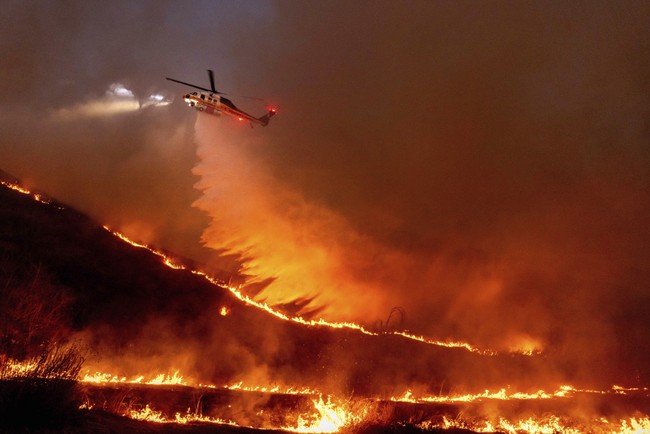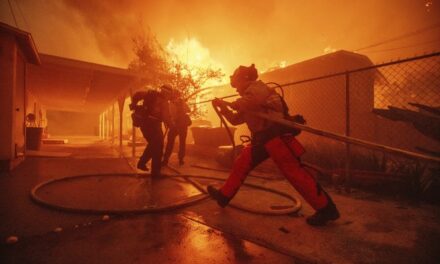We support our Publishers and Content Creators. You can view this story on their website by CLICKING HERE.

The insurance industry in California was already reeling from a combination of natural disasters and the political disaster known as the Democratic Party in California.
Advertisement
As for the former, the combination of too few controlled burns, drier-than-normal weather, and idiotic zoning regulations pushing people into fire-prone areas all contributed to a situation that only needed someone to light a match. And someone did.
The sheer idiocy of California Democratic Party officials preferring to embrace environmental posturing rather than sound policy is hard to fathom at this distance. And it’s not like they weren’t warned. Instead, the officials accepted the slaps on the back from environmentalists for preserving the forest rather than burning off dead vegetation. This was the kindling that created the perfect conditions for a man-made disaster.
What’s done is done, and now comes the aftermath. The University of California, Berkeley’s College of Natural Resources says that “humans have developed into fire-prone wildland areas.” That’s something of a misnomer. In fact, humans haven’t “developed” into wildfire country; they were pushed there by zoning policies that prevented multi-family dwellings from being built across much of Southern California.
The fault for this state of affairs lies with “city planners, and NIMBY lobbyists that have pushed people into these areas and made L.A. one of the least densely populated, most expensive, and most expansive cities in America,” reports Jack Nicastro at Reason.
Advertisement
Michael Manville, a professor of urban planning at the UCLA School of Public Affairs, tells Reason the sprawl of L.A. is in part a function of land use regulations and “the desire to have…the most in-demand kind of housing, which is a nice little family home with a backyard [and] you can’t do that without expanding outward.” Nearly 78 percent of residential land in L.A. is reserved for single-family housing, according to a study published by the Othering & Belonging Institute in 2022.
“Not in my backyard” (NIMBY) proponents have made it nearly impossible for L.A. residents to relocate from the flammable city outskirts toward the city center. Although it’s possible to build a lot of houses on paper, “in practice, it’s extremely difficult because the zoning capacity that we have is on land that’s already developed,” Manville explains. The solution is to “take these areas that are zoned for very low density and allow them to build four or five units.” Unfortunately, single-family zoning makes doing so illegal, hampering L.A.’s ability to recover from the Palisades and Eaton fires.
Of course, people don’t have to move into a fire zone. However, Los Angeles, despite every effort by Democrats to turn the area into an open-air toilet, is still a desirable location for many people. Politicians in the pockets of developers aren’t concerned about fire hazards. It’s not a selling point for developers looking to fill up their latest single-family tract housing.
Advertisement
Insurance companies are now on the hook for at least $20 billion in residential home losses, and that number is still growing. The major companies have been cutting policies and refusing to sell new policies in some areas. But because politicians and regulators don’t recognize that insurance costs are based on risk, not political necessity, the companies are getting it coming and going.
The state’s largest home insurance provider, State Farm, announced in March of last year that it was discontinuing coverage of 72,000 home and apartment policies across the state, citing inflation, regulatory costs, and the rising risk of catastrophes, according to a report from Fox Business. The action was on top of slowing down the approval of new policies.
Other leading insurers like Allstate, Farmers, and USAA have curbed new policy applications in California to limit their exposure to “undue risk,” according to the report.
Even those in the tony enclave of Pacific Palisades, where many homes were decimated, have reportedly been denied coverage recently.
The insurance crisis is not going to be confined to California. A Harvard study, “Pricing of Climate Risk Insurance: Regulation and Cross-Subsidies,” demonstrated how companies operating in California will try to recoup their losses by charging higher premiums for policies written hundreds or thousands of miles away.
Advertisement
Ishita Sen, who co-authored the study, told The Wall Street Journal, “It’s spread all over the country, and it spreads in a disproportionate way, where some people are bearing an overwhelmingly higher cost.”
California Insurance Commissioner Ricardo Lara is promising to use his powers “to prevent insurance companies from canceling or non-renewing policies in wildfire-impacted areas.” That will only make the crisis worse.
I smell a federal bailout of the insurance industry, which would only be granted if radical reforms ensure it never happens again.

 Conservative
Conservative  Search
Search Trending
Trending Current News
Current News 







